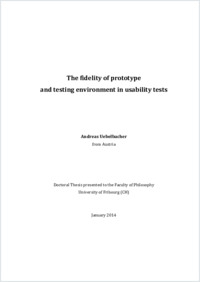The fidelity of prototype and testing environment in usability tests
- Uebelbacher, Andreas
- Sauer, Jürgen (Degree supervisor)
-
2014
1 ressource en ligne (117 p.)
Thèse de doctorat: Université de Fribourg, 2014
English
This doctoral thesis investigated what setup of a usability test can best support valid test outcomes. Several aspects of contextual fidelity were manipulated in experimental usability studies, to examine their impact on test results. The first study demonstrated that the medium of prototype presentation has effects on test outcomes, which have not been found in previous research. Using a more hypothesis-driven approach, it was shown that participants exhibited more reading activity when using a paper-based as compared to a computer prototype presented on screen. This resulted in better performance, if task success required reading a short paragraph of text. Consequently, the medium of prototype presentation needs to be considered to avoid that respective usability problems go undetected. A second study demonstrated that additional observers may cause stress for test participants, which can be measured at the physiological level. Some performance indicators were affected, but only in interaction with perceived developmental stage of the test system. A third study investigated the effects of a work or leisure context on the outcome of a usability test. No effects were found for the type of usage context, but even short response time delays proved to be relevant for performance and emotions. Relevant factors for the validity of usability test outcomes were identified and theoretical and practical implications are discussed. Keywords: Usability test; paper prototype; fidelity; observer presence; work and leisure domain; system response time; heart rate variability; validity.
- Faculty
- Faculté des lettres et des sciences humaines
- Language
-
- English
- Classification
- Psychology
- Notes
-
- Ressource en ligne consultée le 22.08.2016
- License
-
License undefined
- Identifiers
-
- RERO DOC 261759
- URN urn:nbn:ch:rero-002-115443
- RERO R008489844
- Persistent URL
- https://folia.unifr.ch/unifr/documents/305100
Statistics
Document views: 300
File downloads:
- Texte intégral: 741
